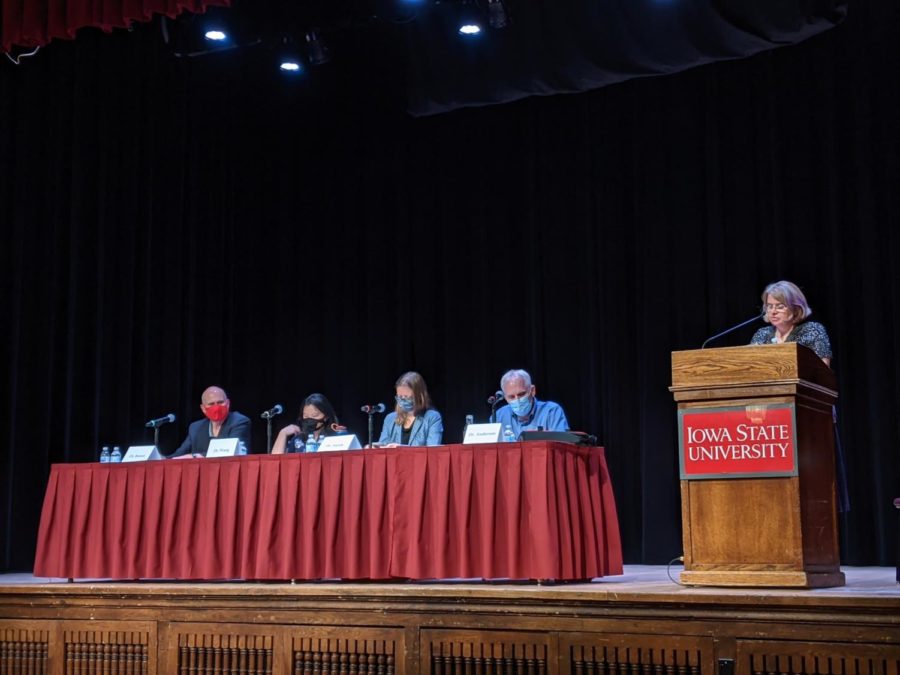Iowa State’s Lecture Series starts the year off with a panel discussion on climate change and its effects
Panelists (from left to right), Dr. Robert Brown, Dr. Yu Wang, Dr. Amy Erica Smith, Dr. Craig Anderson and moderator, Karen Kedrowski.
September 2, 2021
A crowd gathered in Memorial Unions Great hall Thursday night to see a panel discussion on climate change and its place in today and the future. The discussion was titled “The Uninhabitable Earth? Climate Change and Your Future”, after a book that covers similar topics. The panel consisted of some of Iowa State’s greatest experts in a range of topics related to climate change, and as the listeners found out through the discussion, everything is related to climate change.
Iowa State Political Science Professor, Karen Kedrowski, moderated the event, posing questions to the panelists. Kedrowski asked panelist Dr. Erica Smith, an expert in Political Science, “Why should Iowans care about problems that seem to be so far away?”
“Iowans need to care about whats happing so far away because we all share the same air ultimately,” Smith responded. “There’s noting that happens in one place in the world that has no impact anywhere else. So the first reason we need to care, is because we have an interconnected planet and changes in one place influence all of us.”
As Smith pointed out, the interconnectedness of the globe means that no effect has zero effects; as the amazon is destroyed, not only the local environment suffers, but the globe as a whole experiences rising temperatures.
Such mechanisms of chaining effects apply not only to environmental systems but political and social systems.
Dr. Craig Anderson, professor of psychology at ISU, explained the effects of climate change on individuals and groups.
“There are studies from experimental laboratories as well as studies by economists and political scientists, all lead to the same conclusion that rapid global warming in particular will and already has increased violence around the world,” said Anderson. “Laboratory research has shown that when people get uncomfortably hot, all else being equal, in non-jargain terms, they become more irritable. That leads to increases in violent behavior.”
Anderson explained the concept of echo immigration and the problems that could arise within a country when regions become overwhelmed with drought or other environmental issues. As people flee these regions, they will go to other regions that are more hospitable and that already house people. Such immigration could lead to conflicts.
While these panelists informed on the potential of worsening environmental and political conditions, others expressed methods and ideas for improving the world’s position with climate-related issues.
Dr. Yu Wang, associate political science professor, offered ways that individuals can help to reduce their own effect on the environment.
Wang encouraged people to be more efficient by using LED lighting and more efficient home appliances. She advocated for the use of smart homes and residences to cut down on energy consumption when it’s not being used. Wang also pointed out that at night much of energy in Iowa comes from wind power, so waiting until night to do things like run appliances and charge devices means using cleaner energy to do so.
Wang also highlighted community solar programs and the usage of E-15 fuels as ways for people to reduce their carbon footprint.
Dr. Robert Brown, a professor at Anson Marston in Engineering and endowed chair holder in mechanical engineering at Iowa State, made an analogy comparing the planet’s atmosphere to a swimming pool without a drain. He explained the dilemma of removing pollutants from the pool requiring a pump that needs energy to run. This means that cleaning up the pool is not a passive process where people can simply stop putting pollutants into the pool and wait for the contents to drain out.
Brown explained a few of the methods and technologies that improve the practice of removing pollutants from the atmosphere.
Some processes simply remove carbon dioxide from the atmosphere while requiring energy to run; some others can remove carbon dioxide from the atmosphere while simultaneously creating other products.
“One method involves biomass, it’s a process you might call charcoal making, I call it pyrolysis,” said Brown. “It actually releases volatile gasses from the biomass which we use, we actually condense it into an oil which we can produce into a renewable diesel for example, but it leaves behind a charcoal shell of material, we call it bio-char.”
While seeming like a useless by-product, this bio-char actually makes up a significant portion of the contents of soil in Iowa.
“That carbon will actually sequester under ground for centuries; even thousands of years,” said Brown.
To end the discussion, Kedrowski asked the panelists how they respond when they encounter people who believe climate change is a natural phenomenon that harbors no negative effects for the larger world.
Smith responded by saying that interactions between people of opposing views are often not constructive due to facts and ideas being perceived as aggressive. She suggested still sharing these dialogues but keeping them positive and non-hostile to increase effectiveness.
Overall, the world faces a difficult task ahead: reducing the negative effects of our civilization on the globe while actively cleaning and making it a better place. As climate change accelerates, problems will arise ecologically, economically and politically; people need to be prepared to make personal sacrifices and choices to help make an impact locally and globally.







